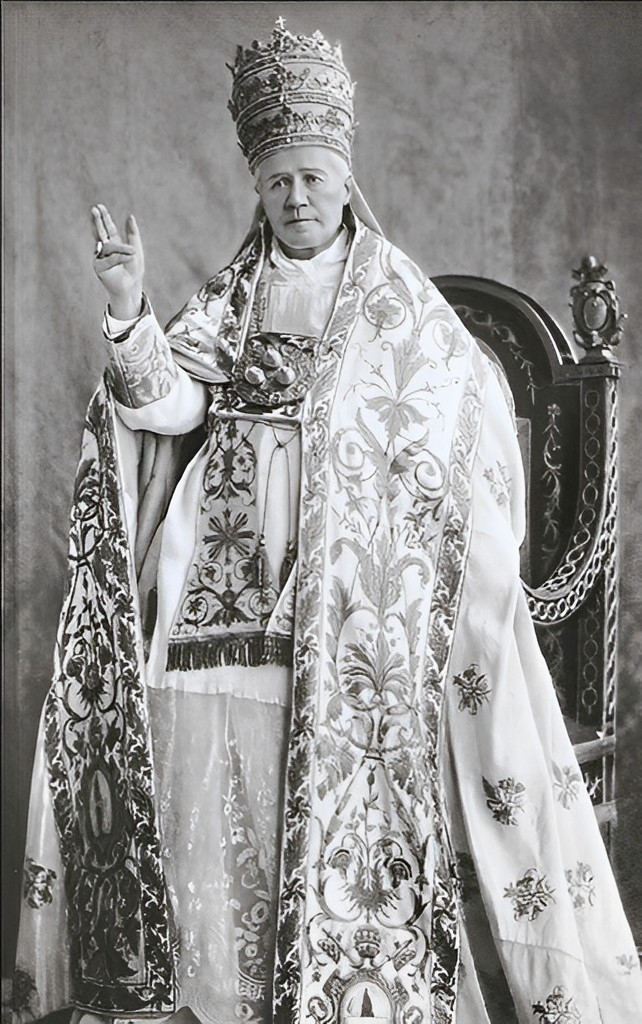|
Plinio Corrêa de Oliveira
Saint Pius X, the Conversion of France, and Unpretentiousness
Saint of the Day, September 3, 1968 |
|
|
Today we commemorate the feast of Saint Pius X, Pope and Confessor. His relic is venerated in our chapel [in the current liturgical calendar, the feast of St. Pius X is celebrated on August 21]. As you know, Saint Pius X can be considered one of the special protectors of our movement, as he is a hero in the fight against Modernism. Modernism is the remote iteration of Progressivism. And if we will see a complete description of Progressivism if we read the documents of Saint Pius X against Modernism. Like many other saints, Saint Pius X had prophetic glimpses. There is a phrase of his with a certain prophetic character that makes us think of the Reign of Mary. While it is about a specific nation, the world today has so deteriorated that the Reign of Mary cannot come just to a single nation. If it does come to one nation, it also has to come to several to finally encompass them all. Therefore, in one way or another, prophesying the Reign of Mary for one nation is prophesying it for all. On November 29, 1911, Saint Pius X addressed to the French people this phrase, found in one of his documents. To understand his words, one needs to consider that during his papacy, Saint Pius X engaged in difficult fights with the French Republic. I read in The Complete Acts of Leo XIII a letter of his to the French president saying that some measures in being proposed in the French Congress were extremely contrary to the Catholic Religion. He was deeply hurt and disappointed because his whole policy toward the French Republic had been one of collaboration. And now, as his pontificate and the days of his life are drawing to a close, the fruit he reaps from this approach is a true religious persecution. The French president replied with a glacial letter: Holy Father, I have received your letter. I understand your sorrow, but the only answer I have to give is that, as president of the French Republic, I have very limited constitutional powers. Therefore, it is not in my power to prevent the events that Your Holiness fears will happen. Please be assured of my respect, etc. Signed so-and-so. I do not know which of those revolutionaries was president of France at that time. Shortly thereafter, Saint Pius X began an uncompromising policy to defend the rights of the Church. Then, an onslaught against religion was unleashed in France. Of course, this onslaught ran into part of the French people faithful to the Church. However, official France, the leadership, turned en masse against Saint Pius X. So did a large segment of so-called Catholic France, including Mgr. Louis Duchesne, a member of the Academy of Letters, and others. They advocated a policy of appeasement between Saint Pius X and France and invited the Pope to make concessions he could not. It was a real misery! In that fight, Saint Pius X had moves of admirable heroism! On one occasion, he consecrated several French bishops together. France law prohibited consecrating bishops without government approval. He called them to Rome, consecrated them himself in St. Peter’s Basilica, and established them in the dioceses. It was likely on this occasion that he promulgated a tremendous encyclical against the errors of the French government. In that climate of admirable struggle, Saint Pius X had this phrase about France: « A day will come, and we hope it will not be far, when France, like Saul on the road to Damascus, will be surrounded by a heavenly light and will hear a voice repeating to her, “My daughter, why do you persecute me?” And to her response, “Who art thou, Lord?” the voice will reply, “I am Jesus, whom you persecute. It is hard for you to kick against the goad, because, in your obstinacy, you destroy yourself.” And she, trembling and astonished, will say, “Lord, what wouldst thou have me do?” And He will say, “Rise up, wash the filth that has disfigured you, awaken in your heart those dormant affections and the pact of our alliance and go, eldest daughter of the Church, predestined nation, vessel of election, go, as in the past, and carry my name before all peoples and before the kings of the earth » (Allocution Vi ringrazio November 29, Acta Apostolicae Sedis, Typis Polyglottis Vaticanis, Rome, 1911, p. 657). As you can see, even his language is interesting: “one day will come.” Then comes a conjecture and uncertainty: “which I hope is not that far away.” Here is no longer affirming but stating a desire, making a calculation of probability. The facts did not confirm that probability. This document was issued in 1911, and we are in 1968. So it has been 57 years since this was predicted and has not happened. However, this will be the outcome for France. When Our Lady says in Fatima, “Finally, My Immaculate Heart will triumph,” it means that she will triumph throughout the world. The conversion of France must happen along with the general conversion of nations. And here we see the conversion of France foretold by Saint Pius X. Now, how did he predict it? To receive that ray of light, Saul had to fall off his horse. It is pretty evident that France will have to undergo countless humiliations in which she must recognize that she is extremely humiliated. At that moment, when her proud place in the contemporary world is destroyed, we can have a converted France and in the Reign of Mary. I used the word pretentiousness on purpose. The more I analyze the history and life of the various TFPs and counter-revolutionaries I learned about who did not belong to any TFP or sister and autonomous entity, the more I am convinced that pretentiousness is the great temptation of a counter-revolutionary! What is pretentiousness? It is for an individual to attribute all his qualities exclusively to himself rather than to grace or a to supernatural gift to which the person has to correspond. I also call pretentiousness, for an individual to become enraptured in both his genuine and false qualities to show off in front of others, pretending to be something he is not. You may tell me: “Dr. Plinio, this sounds like sheer ‘white heresy.’ We see so many problems with people lacking energy, this, that and the other, and you talk to us about pretentiousness?!” I repeat what I said one afternoon to a small number of friends here at our seat: Let us fight pretentiousness with all our soul, and the rest will be added unto us. We must be unpretentious, never wishing to “show off” or stand out. We should behave normally and naturally in our place and, when in doubt, even prefer to fade away among the other counter-revolutionaries. Outside, as we fight our opponents, we must unfurl Our Lady’s standard— and that is another matter. But here, that is how we must behave. I will tell you this: give me an unpretentious soul, and I will give you a soul on the way to solving all your problems. Give me a pretentious soul, and any advice you give him will not work as long he has that propensity. So here is a reflection about France, which also applies to us and everyone. To wage in-depth combat against pretentiousness is to create conditions to solve insoluble spiritual problems. That, my dears, includes punctuality issues. I know everyone here is punctual. We must try to be unpretentious even when it comes to punctuality. With that, let us close. May Our Lord help us march forward and upward! |
|


